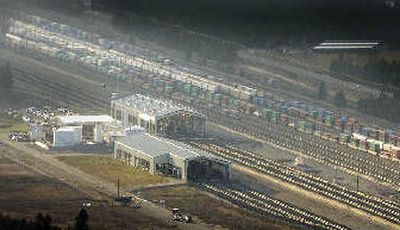Depot suits pile higher

Lawsuits over North Idaho’s leaky BNSF Railway depot continue to trickle into federal court.
With $18 million at stake, the case now seems to involve more finger-pointing than a preschool playground dispute. Subcontractors of subcontractors of the railroad’s general contractor are now being dragged into the quarrel.
None of the seven firms wants to talk about the case, but a stack of court documents shows the convoluted process of assigning blame for the diesel and oil leaks last year from the railroad refueling depot near Hauser, Idaho.
BNSF opened the high-speed refueling depot in September 2004. Within six months, a series of leaks was discovered at the facility, with causes including crushed drainage pipes and thousands of feet of cracks in the concrete refueling platform. Holes were also found in the plastic liners buried below the football field-size fueling platform.
At least one of the leaks sent diesel and motor oil into the aquifer 160 feet below the depot. The aquifer supplies drinking water to about 500,000 people in Spokane, Coeur d’Alene and Post Falls. State officials say no trace of fuel has been found in groundwater downstream from the depot.
Yet the leaks prompted a state judge to shutter the depot for 74 days last spring until repairs could be made. Three months later, BNSF sued its engineering firm and general contractor, claiming the problems were the result of negligence and broken promises.
BNSF spokesman Gus Melonas refused to comment on the case.
The railroad is seeking reimbursement of nearly $18 million, plus attorney fees. The figure includes a $100,000 court-ordered environmental improvement project.
The Illinois-based engineering firm Hanson-Wilson and the Spokane general contractor, Lydig Construction, have since blamed their subcontractors. The latest volley came Friday, when two new complaints were filed in Idaho’s U.S. District Court.
Hanson-Wilson is blaming the leaks on Boise-based Strata Geotechnical Engineering and Materials Testing and Cook Engineering Consultant, of Chattaroy, Wash. Neither company returned phone calls seeking comment Wednesday.
Hanson-Wilson denies that BNSF has been “injured in any manner or to any degree whatsoever.” But if the railroad has, in fact, been wronged, it’s not Hanson-Wilson’s fault, the company has said in court documents. Hanson-Wilson claims Strata failed to properly inspect and supervise the installation of the underground membrane, and also failed to inspect the underground piping and the platform’s concrete.
Hanson-Wilson claims Cook Engineering failed to use “reasonable skill and care” in its capacity as an on-site engineer and project manager. Lydig Construction, the general contractor, has also filed complaints against K.C. Construction of Hayden, Idaho, and Barber-Webb of Los Angeles.
In its Dec. 12 reply to the lawsuit, Barber-Webb claimed it complied with engineering plans and therefore is “immune from liability.” If there was trouble, Barber-Webb says it was from “the sole negligence” of K.C. Construction, according to court documents.
One example of the case’s complexity centers on a crushed wastewater drain pipe. Although Hanson-Wilson designed the pipe, it was installed by Lydig Construction or one of its subcontractors. The subcontractors guarantee their work, but the engineering firm is supposed to provide oversight and final testing.
No lawyer involved with the case who was contacted for this story was willing to comment. But Spokane attorney and longtime depot opponent Rachael Paschal Osborn speculated the case will only get more convoluted, with additional parties being “joined” to the lawsuit.
“Maybe they’ll eventually join the guy who was driving the backhoe who drove over the wastewater pipe,” Osborn said.
Typically, insurance companies eventually become involved, she said. Insurers often want to quickly and quietly settle the dispute outside of court. “The ultimate outcome may not even see the light of day,” she said.
Osborn also suggested another reason why the businesses are reluctant to discuss the case publicly: “It’s bad publicity for the contractors. Who would want to be associated with this?”
Resolution is not expected anytime soon in the case now known as BNSF Railway v. Hanson-Wilson v. Lydig Construction v. K.C. Construction v. Barber-Webb v. Strata Geotechnical v. Cook Engineering. Court documents filed Monday indicate March of 2007 as the earliest date before expert testimony will be ready.